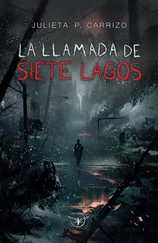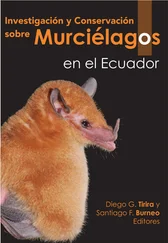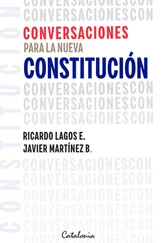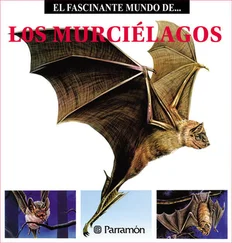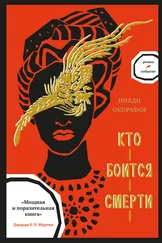Ннеди Окорафор - Lagos Noir
Здесь есть возможность читать онлайн «Ннеди Окорафор - Lagos Noir» весь текст электронной книги совершенно бесплатно (целиком полную версию без сокращений). В некоторых случаях можно слушать аудио, скачать через торрент в формате fb2 и присутствует краткое содержание. Город: New York, Год выпуска: 2018, ISBN: 2018, Издательство: Akashic Books, Жанр: Детектив, на английском языке. Описание произведения, (предисловие) а так же отзывы посетителей доступны на портале библиотеки ЛибКат.
- Название:Lagos Noir
- Автор:
- Издательство:Akashic Books
- Жанр:
- Год:2018
- Город:New York
- ISBN:978-1-61775-523-1
- Рейтинг книги:4 / 5. Голосов: 1
-
Избранное:Добавить в избранное
- Отзывы:
-
Ваша оценка:
- 80
- 1
- 2
- 3
- 4
- 5
Lagos Noir: краткое содержание, описание и аннотация
Предлагаем к чтению аннотацию, описание, краткое содержание или предисловие (зависит от того, что написал сам автор книги «Lagos Noir»). Если вы не нашли необходимую информацию о книге — напишите в комментариях, мы постараемся отыскать её.
Lagos Noir — читать онлайн бесплатно полную книгу (весь текст) целиком
Ниже представлен текст книги, разбитый по страницам. Система сохранения места последней прочитанной страницы, позволяет с удобством читать онлайн бесплатно книгу «Lagos Noir», без необходимости каждый раз заново искать на чём Вы остановились. Поставьте закладку, и сможете в любой момент перейти на страницу, на которой закончили чтение.
Интервал:
Закладка:
The children ran into their room and lay down in silence, listening for sounds from the living room. They thought they heard their father moving about and hoped he was going to bed. But they didn’t hear any doors open or shut.
“What if Daddy...” Ifechi whispered.
“Shhh!”
Apart from the thumping in their chests the children could hear nothing. They lay quiet for what felt like a very long time. Soon, Ifechi began to drift off to sleep. But the next sound wiped every trace of sleep from her eyes and almost stopped her brother’s heart.
“Madu! Ifechi!”
Ifechi felt hot liquid seep between her legs and she clamped her thighs together. “Madu! Daddy is calling us,” she whined.
“Shut up,” Madu hissed. “Act as if you’re sleeping.”
“Madu! Ifechi! Come out here now!” Their father’s voice was closer; they could hear his footsteps approaching their door.
“Madu,” Ifechi pleaded.
“Shut up and close your eyes,” Madu said. “Don’t say anything.”
The children’s bedroom door flew open, ricocheted against the wall. Their father filled the doorway.
“Both of you, get up right now!”
Madu blinked up at his father’s face. “Yes, Daddy?” he said, attempting a sleepy murmur. Ifechi, with her wide eyes and trembling lips, was less convincing.
“Get out now! To the parlor!” their father barked.
They stumbled out of their beds as their mother came to the door. “Chuma,” she said to their father, “what is it?”
He gave no reply. He followed behind Madu and Ifechi as they shuffled into the living room. Their mother joined them seconds later.
“Who has been watching this film?” their father asked, brandishing the cassette tape.
Ifechi glanced up from her feet to her brother’s face. Maybe if she confessed quickly their father would have mercy. She could tell the truth and shame the devil. She could say it was Madu’s idea, which was the truth. But if she did that Madu would never talk to her again.
“What film is that? Let me see,” their mother said. She stepped closer and took the tape from their father. She read the title, and her body grew tense. She gave her husband a long, pointed glare as she held out the cassette to him. He took it, but only when he looked away did their mother turn to Madu and Ifechi.
“So I have been breeding dirty maggots in this house, ehn?” she said. “Instead of reading your books, this is what you spend your time doing when we are at work?”
“This is the last time I will ask both of you,” their father said. “Who watched this film?”
Ifechi looked at the tape in her father’s hand. His palm now covered the portion of paper on the cassette that had his initials.
“It was me.”
Ifechi gasped and snapped her head up to look at her brother. He was staring into the space in front of him.
“Only you, Madu?” their father asked after a brief silence. He turned to Ifechi. “What about you?”
“She was with Aunty Hope,” Madu answered for his sister.
“Is it true?” their mother asked Ifechi, who could only nod. She knew her voice would fail her if she tried to speak.
“Ifechi, go to my room and bring my koboko,” their father commanded.
Ifechi managed to steady her legs and direct them out of the living room. She’d always loved the smell of her parents’ bedroom — camphor and a blend of their perfumes. But as she entered their room this time she took quick, shallow breaths. She reached into the floor of her father’s wardrobe for the whip: Mr. Koboko, as they called it when they were being playful. But there was nothing playful about the rough brown leather of the whip when it stung the skin, the three strands, like tentacles, curling around limbs and leaving welts wherever they touched. Ifechi felt lightheaded at the thought of the koboko hitting her brother’s flesh. She stumbled in the bedroom doorway on her way out and paused to gather herself. Still, her hands shook as she presented the whip to her father, careful not to make contact with his skin.
“Now go to your room,” he said to her.
“No,” their mother snapped. “Let her watch so she can learn.”
So Ifechi watched as her brother lowered his pajama bottoms and placed his palms against the nearest wall. Their father raised his hand with the koboko in it, and as he let it come down on Madu’s buttocks Ifechi squeezed her eyes shut. She couldn’t see, but she could hear — the whoosh of the whip, her father’s grunts, her brother’s gasps. After six lashes Madu started to cry. Tears stung Ifechi’s eyes and she squeezed them even tighter, but the tears found a way to seep through. By the tenth stroke Madu was begging, his voice choked with phlegm: “Please, Daddy! Daddy, please, please, I won’t do it again!”
Their father’s response was a warning: “If you rub your buttocks, I will start counting from one.” That was when Ifechi stopped counting.
When it was finally over Ifechi felt like her legs would crumple beneath her. Their mother’s was the only dry face in the room; their father’s was dripping with sweat. He let the koboko fall from his hand, like he’d purged himself of something.
“What do you say?” their mother asked.
Ifechi looked from her to Madu as the seconds stretched into an eternity.
“What do you say?” she asked again, her tone sharp this time.
Madu stared at the ground. When he opened his mouth his words were almost inaudible. “Thank you, Mummy. Thank you, Daddy.”
They were sent to their room. With each shaky step Madu took he grew bigger in Ifechi’s eyes — her big, strong brother who would protect her from the world. She promised to never annoy him ever again, swore she would do anything for him.
Madu flopped onto his bed, burying his face in his arms. Ifechi could hear his sobs, hear the sound of their parents trying to argue quietly in the living room. She sat on the floor beside Madu’s bed, rubbing his head and chanting, “Madu, sorry. Madu, sorry...” Seeing that her brother was not comforted, Ifechi went to their dressing table and grabbed the tub of Vaseline, because Vaseline could heal anything.
“Madu, should I rub Vaseline on your bum-bum?”
Ifechi got no response. When she started to tug on Madu’s pajama bottoms, his arm shot out of nowhere, knocking the tub of Vaseline out of her hand and across the room where it crashed into the wall.
It was two weeks later and school had reopened after the long holidays. Madu and Ifechi’s school was on a side street off St. Gregory’s College Road. Even though Obalende Primary School was much closer to their home, their parents would not hear of it. “I can’t have my children mixing with those urchins,” their father had said once to a neighbor who’d expressed concern at the distance Madu and Ifechi had to walk every school day. Before their mother got a job she used to be around to take them to and from school. Now she only dropped them off in the mornings, with prayers and admonitions to guide them on their way back home: Don’t talk to strangers, look properly before crossing, never pick any money or strange object from the ground, never ever ride on an okada to get home.
The first few times they’d walked back home on their own Madu had murmured his mother’s warnings like a mantra, all the way from St. Gregory’s College Road, to Obalende Roundabout, to Forest Street, and onto Ijeh Village Road. Gripping his sister’s hand he’d weave through throngs of people at the bus stops. He’d attach himself, his sister in tow, to unwitting adults and cross the busy roads with them.
But those days felt like a long time ago to Madu. Removed now from the shelter of his parents’ cars, he had grown accustomed to the pulsating mass that was Obalende, with its countless yellow danfos and molues, conductors courting passengers to faraway destinations across the city — Oshodi, Ikeja, Yaba — traders wooing passersby with wares that could cure anything.
Читать дальшеИнтервал:
Закладка:
Похожие книги на «Lagos Noir»
Представляем Вашему вниманию похожие книги на «Lagos Noir» списком для выбора. Мы отобрали схожую по названию и смыслу литературу в надежде предоставить читателям больше вариантов отыскать новые, интересные, ещё непрочитанные произведения.
Обсуждение, отзывы о книге «Lagos Noir» и просто собственные мнения читателей. Оставьте ваши комментарии, напишите, что Вы думаете о произведении, его смысле или главных героях. Укажите что конкретно понравилось, а что нет, и почему Вы так считаете.
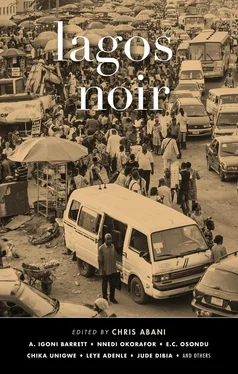


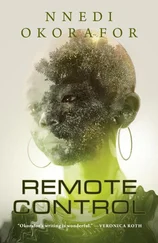
![Ннеди Окорафор - Бинти [litres]](/books/399229/nnedi-okorafor-binti-litres-thumb.webp)
![Ннеди Окорафор - Кто боится смерти [litres]](/books/401080/nnedi-okorafor-kto-boitsya-smerti-litres-thumb.webp)
